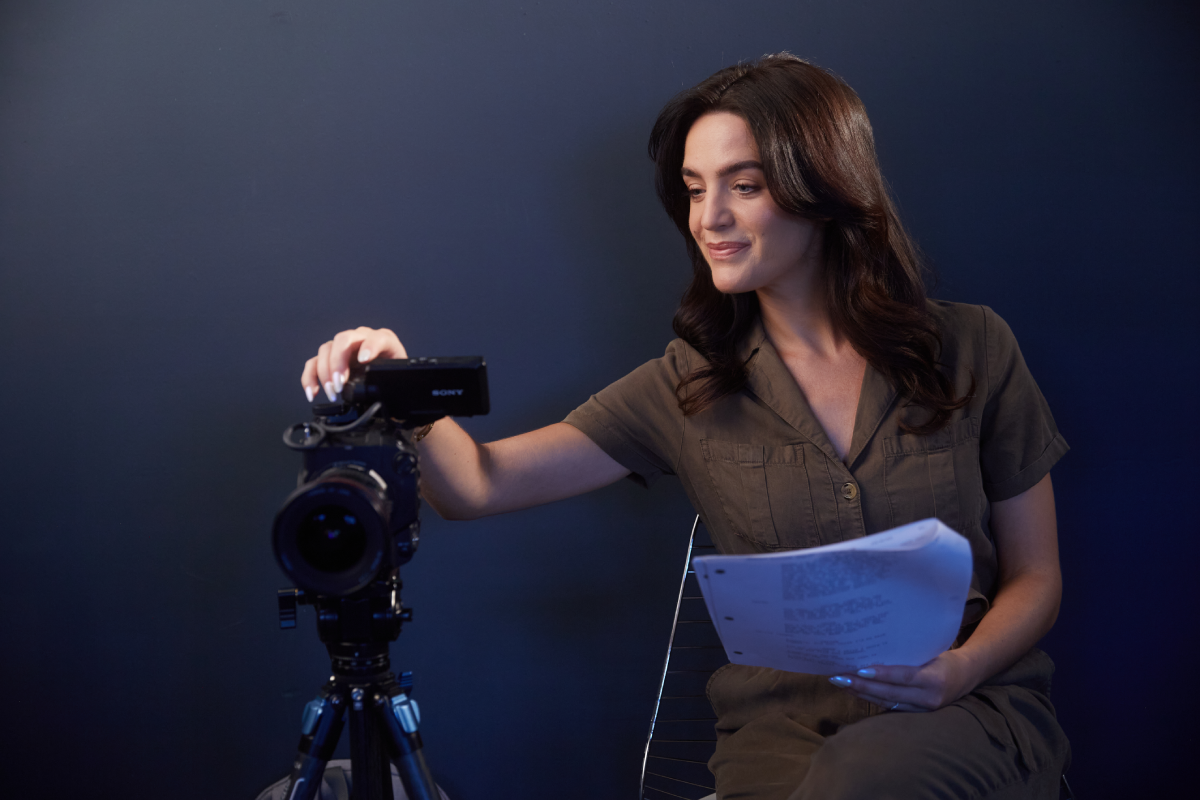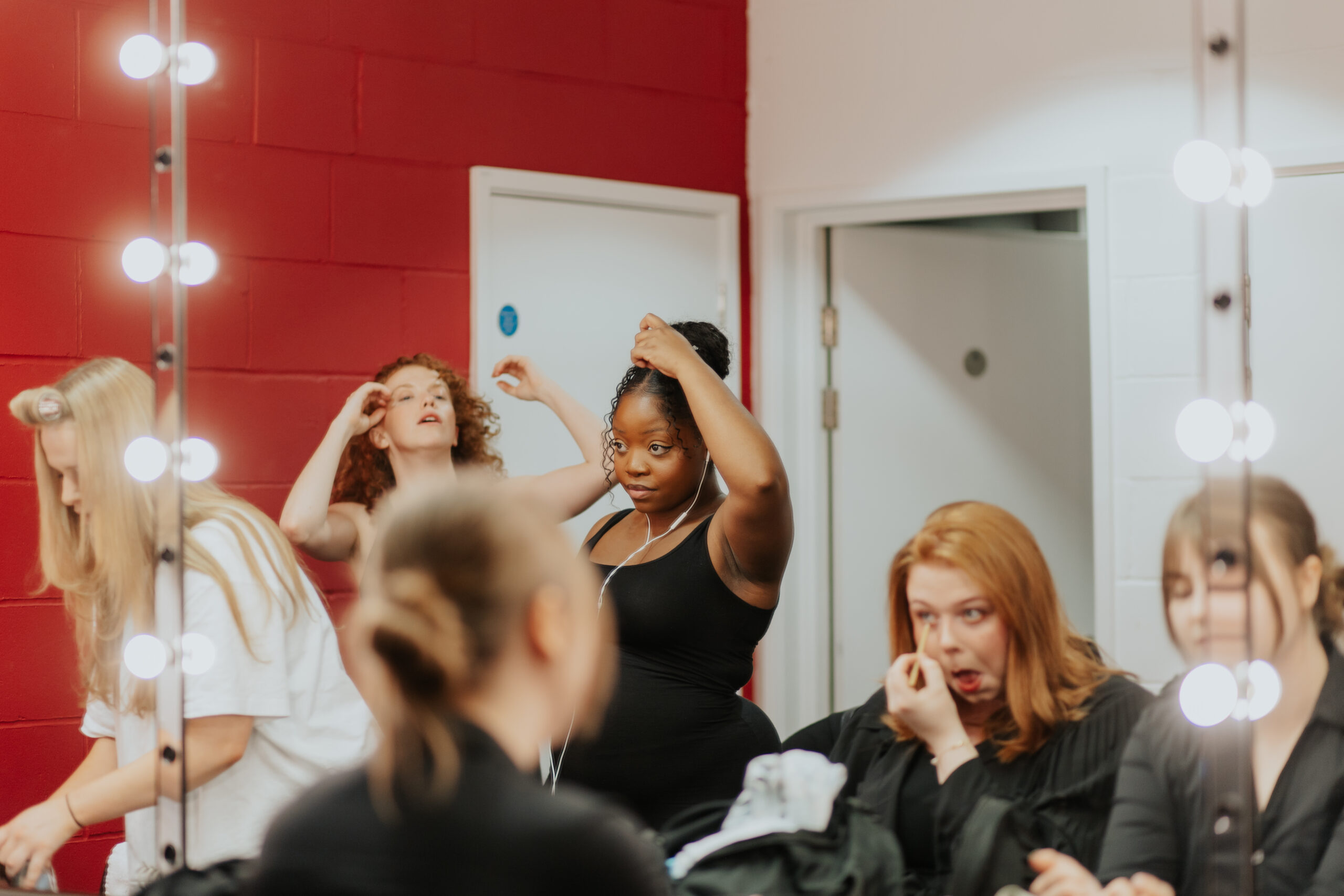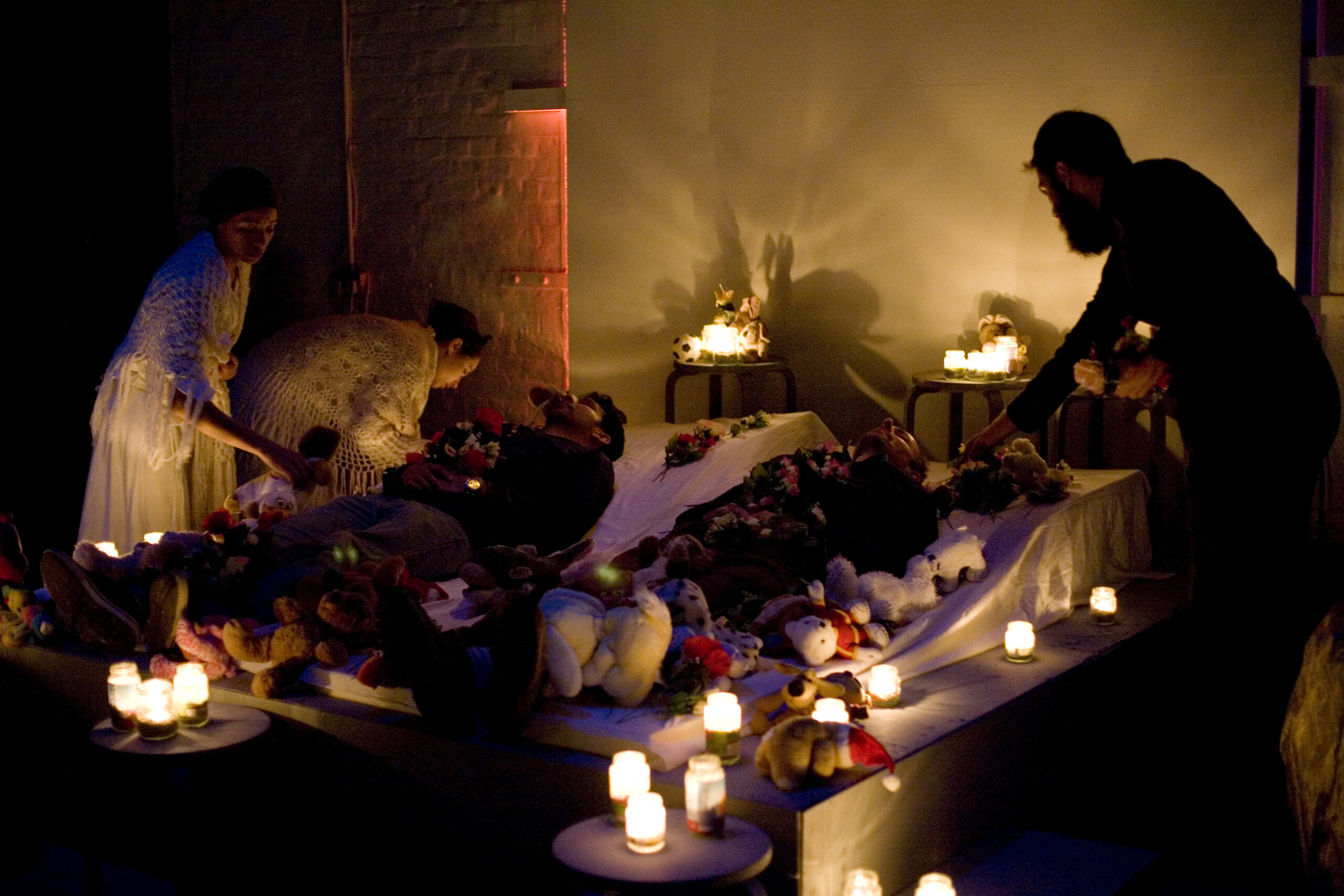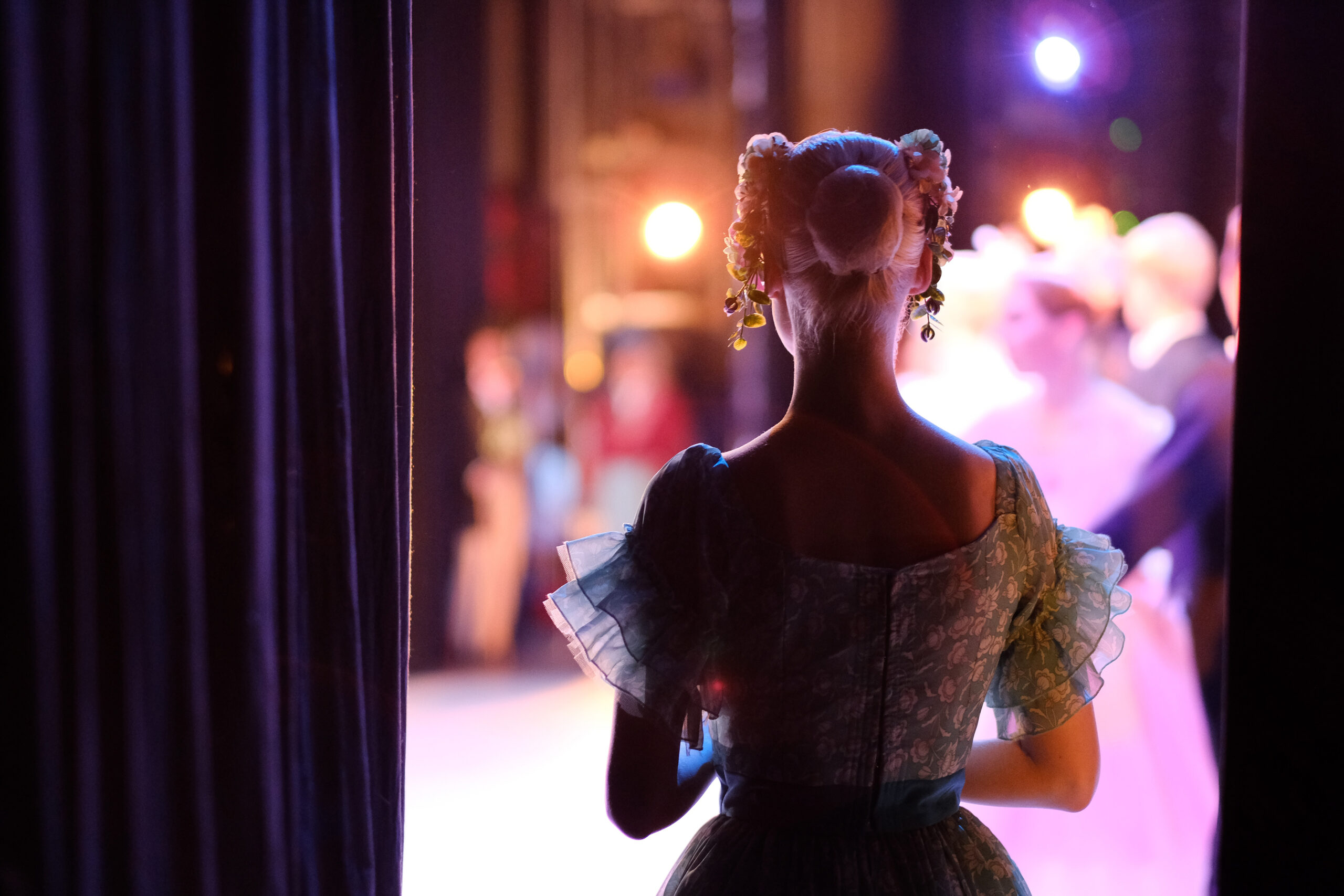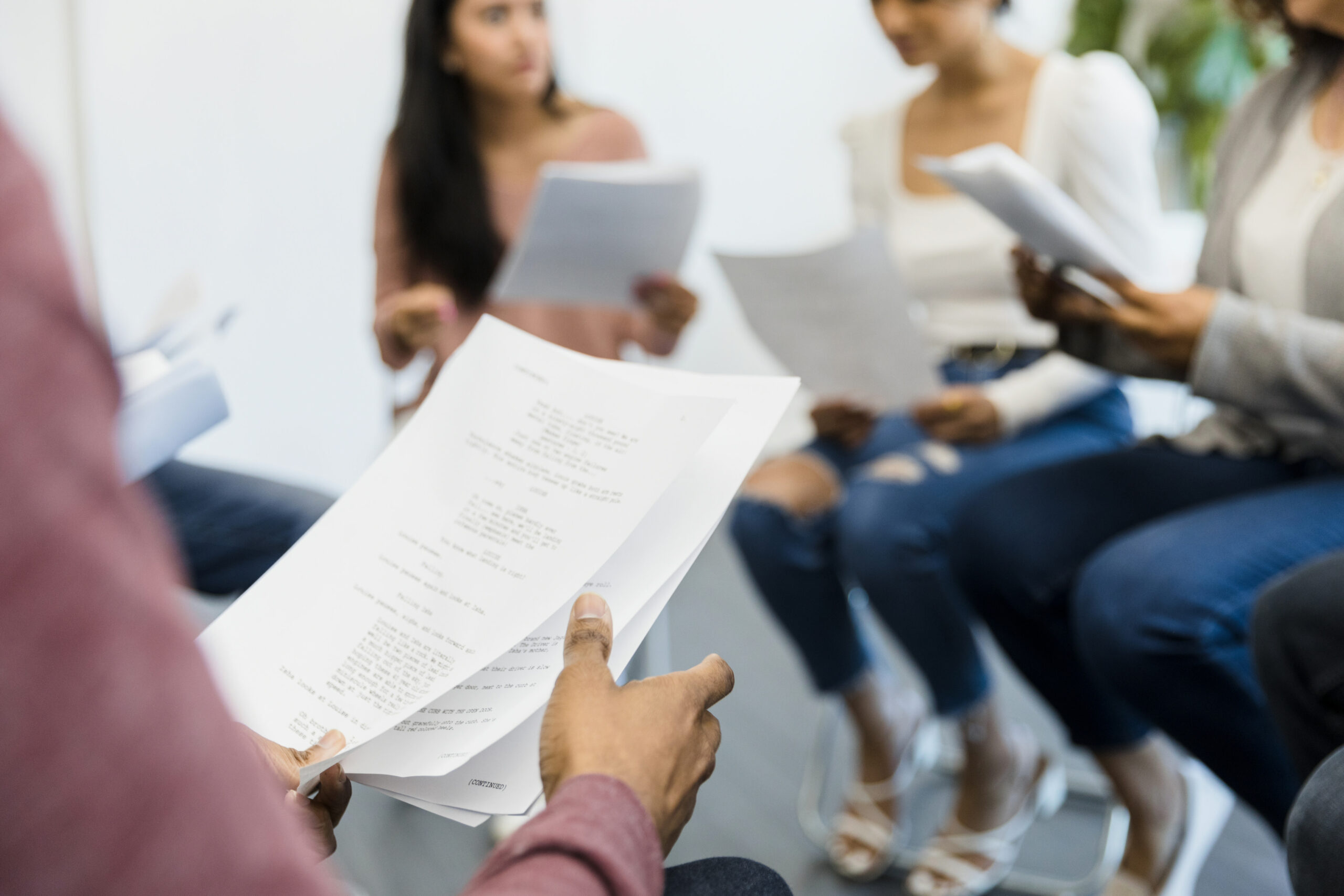Top tips on how to prepare for a role on the stage, analyse a script and perform for a live audience.
The theatre is a space that surges with energy that can feel both exciting and overwhelming. Acting for the stage requires a different approach than film or television and it isn’t necessarily about making your performance bigger.
Preparing a role for the stage is about finding the authentic nature of a character and their place in the story of the play. It’s about grounding yourself on stage while connecting to the energy in the auditorium. It’s also about starting a process and following it through to the very end. Acting on stage gives a performer the chance to follow a character’s whole journey – with weeks of rehearsals to fine-tune who that person is and live in their experience.
But how do you apply everything you learned in rehearsals? How do you perform with ease and tell the truth in imaginary circumstances? Where do you find the energy and motivation to keep your performance fresh each time the curtain goes up?
In this article, we will explore how to prepare for rehearsals, how to build the life of a character and how to deal with the nature and demands of performing live theatre.
Breaking Down the Script
Before any theatre production begins, it’s important to read the play. It may sound simple enough, but before a first table read, it’s essential to create an understanding of the material. Read it alone and without colouring it with thoughts on how it would be performed.
Breaking down the script is how you can build on your character, tracing their arc from beginning to end and using what you’ve discovered to figure out what the play is truly about. Try to understand what happens, where it all takes place and how it makes you feel.
The script should be highlighted and used to write acting and blocking notes. I like to have two copies: one that’s clean and one that’s completely covered in notes. I also like to keep a notebook throughout the process that acts as a companion guide for rehearsals. You might like to use it to write a list of things you need to research, like words you don’t understand or historical references.
Doing homework on the play is how you can deepen your understanding about the time and place your character comes from.
The script is the life source of the play – everything you need to know is in there. Even when you are at the very end of the process, the script is still there for rediscovery. I have had many conversations with actors who said they found new meaning in the lines their characters had said years after playing them. The script is full of possibilities, so use it as often as you can. Even when you think you know everything, there will always be more to learn.
Learning Lines
One of the first things about working in theatre that may feel like a hurdle is learning lines. There is a freedom that emboldens an actor when you can recall lines from memory.
A great way to start the process is by writing the lines out on paper and sticking the pages up somewhere you can see them every day. Dedicate at least 30 minutes a day to repetition, saying the lines aloud while you’re standing or moving.
Retaining the lines while you’re doing something physical helps activate brain power. Make sure to copy the words exactly and read them properly as you repeat them. This will help avoid common mistakes like adding words you think are there or replacing words for ones with the same meaning.
Remembering lines becomes easier when you understand the meaning of what you’re saying. Once you’ve done the work on the character, you’ll begin to create emotional attachments. The lines you find the hardest to memorise will begin to hold weight. Remember, memorising is not the same as understanding, so don’t rush the process. The work of memorisation is a combination of repetition and comprehension, so let go of the script when you feel confident enough in the work you’ve done.
Take a look at this video for more ways to learn your lines
Character Research
Using your notebook, you can start your preparation on the character by going through the script to look for clues about who they are. Look for anything your character says about themselves, anything another character says about them and anything the stage directions say.
You should have a list like this:
“I am stubborn.”
“She is stubborn.”
Alice leaves the room.
Once you’ve gone through the whole play, you should have a better idea about what kind of person your character might be. Is their perception of themselves contradictory to what the other characters think of them? Do the stage directions give you any indication about who they are and why they enter or exit a scene? Everything the playwright has written is intentional, so use the script as a fact-finding tool on who your character is and why they behave the way they do.
You can also begin to journal as the character, writing in the style of a flow of consciousness. Using the adjective ‘stubborn’ from the example above, write about what happens in a pivotal scene with this personality trait as an anchor. How might this new perspective change your approach to your character? Can you start to see the reasons why your character behaves the way they do?
The purpose of this exercise is to put yourself in the character’s thought process without the script. Your character has a point of view and a purpose. Doing the preparation work helps you perform the role and allows your character to become a fully formed person that an audience can connect to.
Everything that happens before and after the play is also just as important, even if it’s never seen. You can create moments before going on stage to give yourself the motivation and emotional stakes you need. Explore physicality and think about how they walk. What kind of music do they listen to? Every choice you make for this character is important because it informs the world of the person you’re playing.
Rehearsals
Rehearsals are for exploration. It’s a period of time where you bond with your cast and create a safe space for creativity.
How you show up in rehearsal is vital. Be ready to work, be on time and be prepared for the day ahead by organising your time efficiently. If you know the schedule ahead of time, be sure to have everything you need to fuel you through a long day.
A production should work enough breaks into a day of rehearsing for you to rest, but you should also consider what extra precautions you might need to take. Stay hydrated and organise your time before and after rehearsals in a way that facilitates your downtime so you can preserve your energy for longer days.
Rehearsals usually start with a table read with the whole cast and then they move ahead by working on the play in chronological order. How a rehearsal process goes is usually down to how the director likes to work. Some directors prefer to leave the process up to discovery and allow actors to find things within the scene and commit to what works. Other directors might have blocked scenes ahead of time to uplift their vision of the production as a whole. Be open to the process and contribute to rehearsals by making choices and trying new ideas for your character.
Use your script in rehearsals to write notes and keep track of your blocking. Be sure to write down where on stage you enter and exit every scene. During rehearsals, you’ll also be given an ‘off-book’ date. This means a time in rehearsals where you should have your lines memorised. It is typically at least two weeks before opening night.
Take a look at our guide for more about what to expect on your first day of theatre rehearsal.
Pre-Show
Once the show is ready for opening night, you’ll get your call time for the first performance. You should have around an hour, if not longer, to get ready. It’s important to establish a routine as nerves and adrenaline will start to surge – especially for the first week.
Try to arrive at the theatre a little earlier at the start of the run. This way, you can get an idea about how long it’ll take you to get ready and you can adjust your timings later.
Once you arrive, start by warming up physically and vocally, and do any exercises that keep you fit for the performance – but nothing too strenuous. A warm up should take around 30 minutes or less. Stay hydrated and eat before the show to fuel your performance.
You should then do your pre-show checks, looking at things like costumes and props. These should be in the right place at the top of the show. Rewarding yourself with the knowledge that everything is in place will give you confidence that the show will go smoothly.
One of my favourite things to do before a show is to sit in the auditorium and look at the stage. It helps me feel a sense of ownership over the space. There is an intimacy on stage that you can’t comprehend from the audience unless you are watching.
To combat the nerves of opening night and beyond, use your pre-show ritual to ground yourself and remind yourself of the work you have done and how important it is to share it.
Performing for a Live Audience
In live theatre, the audience is very much a part of the experience. The set, the costumes, the music – everything – is working in tandem to create the world of the play and the actors are there to facilitate the journey for the audience. Something I often hear from theatre actors is how they feel about the audience. Some refuse to acknowledge them because it brings about a sudden awareness of being watched, and others play to them.
However you feel about the presence of the audience, it’s important to invite them into the experience of the play. Connection is what makes theatre so transcendent. Seeing heightened moments played out in front of you is where the stage differs from the screen. Once you’re performing in front of the audience, you might find nuances in the play – laughs where there weren’t any before and the sounds of audible enjoyment. Everything contributes to the experience. Take the nature of live theatre and hold the space for it. Wait for the laughs and bring the moment back from distractions.
Things can go wrong in live theatre. Your initial reaction might be to carry on as if nothing has happened. If prop furniture falls down or doesn’t work, you’d be forgiven for thinking the audience won’t notice. Once, in a show, a prop gun I was using didn’t go off and it was vital to the play that my character shoots another character on stage. My co-star was also meant to shoot someone on stage, so in that performance, she shot them both and we managed to play it off as if it were meant to happen that way.
Panicking or ignoring mishaps actually draws the audience’s attention to it and away from the illusion of a rehearsed performance. Trust in the work you have done and even if things go wrong, the audience will see you commanding the space, reacting honestly and upholding the life of the play.
Where dropping lines are concerned, it can be tricky. This is where you might get away with carrying on without the audience realising. You will always find your way back, but it might feel like it takes an eternity. It’s important not to panic; keep going and trust the actors you share the stage with to help you. There is something telepathic between the actors on stage when they drop lines. If you’ve built trust in rehearsal, something will happen to keep you on course.
I once lost my voice on stage during a crucial high-stakes scene. All I could think about was getting off stage as quickly as possible and the other actors in the scene knew something was wrong and picked up the pace. During the interval, a few of them told me they were thinking of a plausible action to get me a glass of water during the scene to help. Things can go wrong, but if you trust yourself and those around you, you’ll find a way through it calmly.
Anything that’s gone horribly wrong that’s unavoidable will have the show stopped by your trusted stage manager.
Stage Acting
Acting for the stage is a thorough process. There are elements in understanding how to move on stage that differ when compared to screen work. A common misconception about theatre actors is that everything is exaggerated and therefore loses its authenticity. However, the truth of a moment is clear through an actor’s presence and their ability to meet that moment – even when it goes wrong.
Combining technique and skill with spontaneity is at the heart of what stage acting is. Stand in your light and upstage of the other actor in a scene so that you invite the audience in. Know your lines inside out, but deliver them with nuance and conviction as if they were your own thoughts.
The best thing you can do as an actor is to learn to act on stage. The theatre is a thrilling place – it’s an art form for social commentary, a time machine for period pieces and, for an actor, it’s playing out the most extreme moments of the human experience. It’s sharing laughs with an entire auditorium and going home at the end of the night, only to do the same thing the next night, knowing you’ll never recreate the same experience.
 Karen is a British actor of south Asian descent, born and raised in Birmingham, England. She is a graduate of The American Academy of Dramatic Arts in Manhattan, New York. Most notably known for her role as Nicole Shelley in the award winning Apple TV+ series Ted Lasso starring opposite Jason Sudeikis, Hannah Waddingham, Brett Goldstein and Nick Mohammed. She also played Noreen Khan in the first two seasons of the BBC television series Phoenix Rise.
Karen is a British actor of south Asian descent, born and raised in Birmingham, England. She is a graduate of The American Academy of Dramatic Arts in Manhattan, New York. Most notably known for her role as Nicole Shelley in the award winning Apple TV+ series Ted Lasso starring opposite Jason Sudeikis, Hannah Waddingham, Brett Goldstein and Nick Mohammed. She also played Noreen Khan in the first two seasons of the BBC television series Phoenix Rise.
In Theatre, Karen starred in Ayad Akhtar’s The Who and the What at The English Theatre of Hamburg in Germany and performed opposite Scottish actor Alan Cumming in the original musical Me and the girls directed by Tony award winner Douglas Carter Beane. She has also played leading roles in regional premieres of David Harrower’s Blackbird and Duncan Macmillan’s People, Places and Things. In 2022 she was directed by Iqbal Khan in Mismatch at The Birmingham Rep as part of the Sky Comedy Rep Festival. Her other credits include lead roles in Camel written by Charly Clive, Welcome to Thebes, As you like it, Lysistrata, 4.48 Psychosis, The Tempest, Good Fit, She Kills Monsters, American As, Julius Caesar for The Public Theater at Shakespeare in the Park and Journey to America at the world famous Carnegie Hall, New York.
Karen’s selected work on film includes starring in The Waves for MTV Entertainment directed by BAFTA award winner Sindha Agha, Man on the Phone for Red Bear Films and Frank’s Plan for Amazon Prime. She has also appeared in commercials for Aramco, WhatsApp with Alex Scott, TK Maxx, West Midlands Combined Authority and Northwell Health Insurance in New York. She recently performed at the An Tain Arts Centre in Dundalk, Ireland in Why are you here? Directed by Paul Hayes.
Headshot credit: Andy Brown













